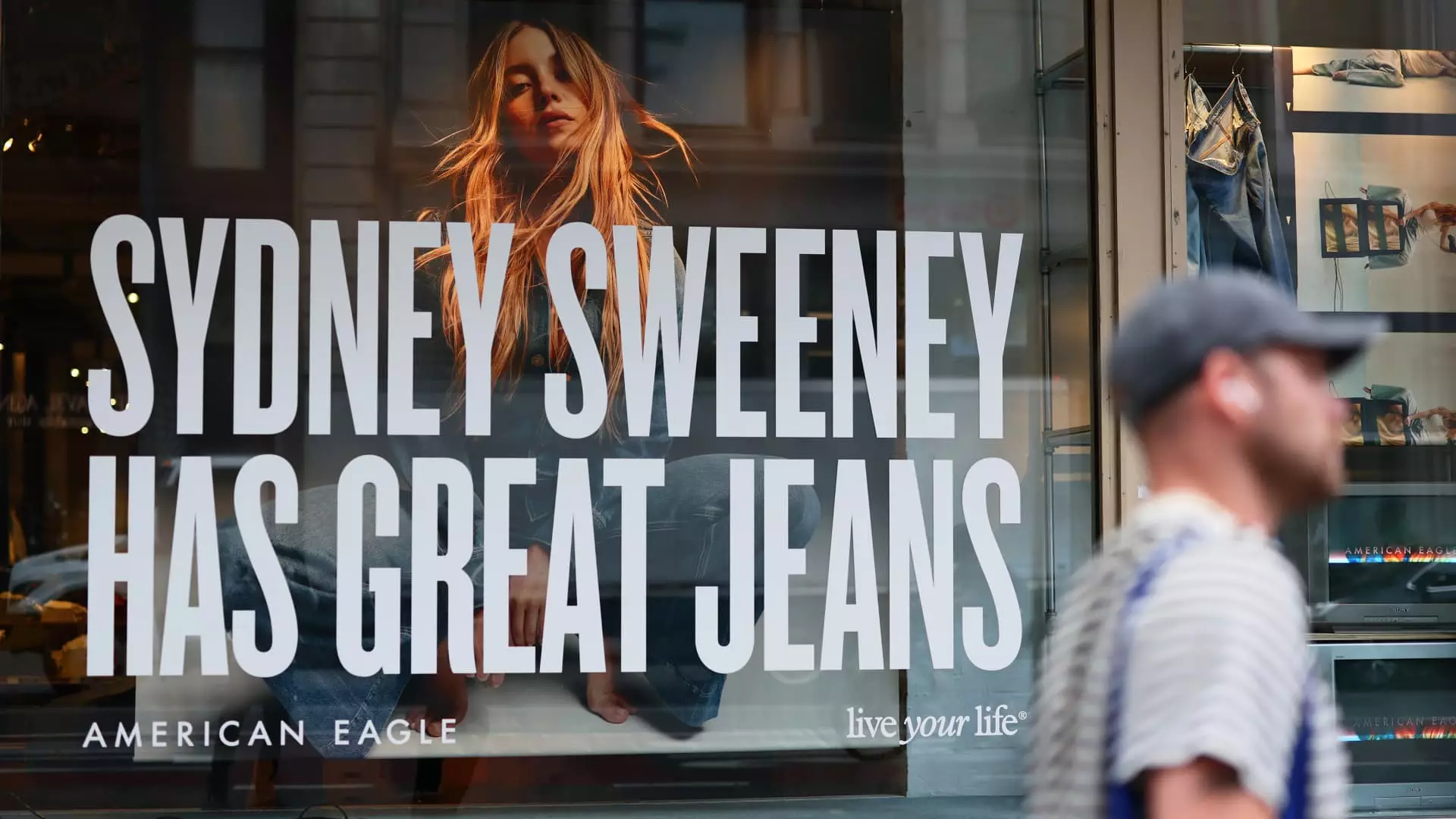In today’s hyperconnected world, companies are walking a precarious tightrope when crafting marketing campaigns. American Eagle’s recent controversy and subsequent stock surge serve as a stark reminder that consumer sentiment is more volatile than ever, and that social and political endorsements—whether explicit or implied—can make or break a brand. The case exemplifies how moments of cultural sensitivity, or perceived insensitivity, reshape corporate trajectories in unpredictable ways.
What’s particularly striking is how a simple endorsement—be it through celebrity partnership or a social media shoutout—can suddenly flip public opinion. American Eagle’s decision to feature Sydney Sweeney, a beloved actress with a broad appeal, was meant to boost visibility and sales. Yet, the campaign’s slogan, “Sydney Sweeney has great jeans,” unintentionally ignited a firestorm rooted in cultural debates around sexuality, identity, and the politics of marketing. Such instances illuminate the inherent risks companies face in trying to resonate authentically with audiences, especially when cultural lines are blurred or misunderstood.
This scenario also reveals the seduction of virality; social media amplifies both praise and backlash at unprecedented speeds. The Trump endorsement, which arrived days later, injected an entirely new layer to the story. Rather than just a marketing misstep, it became a political spectacle, with the former president’s praise fueling a surge in shares—an illustration of how external voices can dramatically influence market perceptions. For corporations, this underscores the importance of recognizing that marketing isn’t just about branding but is also intertwined with the larger socio-political currents.
The cultural divide: Woke politics, conservative backlash, and the grey middle
American Eagle’s experience epitomizes the cultural schism shaping modern corporate decision-making. The division isn’t just about left versus right; it’s about understanding where the middle ground lies—and whether corporations have the agility to navigate it. On one side, “woke” marketing efforts aimed at social justice or inclusivity often fall flat or encounter resistance, as evidenced by the fallout from brands like Bud Light. On the other, overtly conservative or traditionalist campaigns, while often praised by one segment, risk alienating another. American Eagle’s seemingly straightforward slogan, amplified by political figures, straddled this divide, igniting intense debate.
The backlash against the American Eagle ad—portrayed by critics as sexualized or out of touch—reflects a broader societal pushback against marketing that feels disconnected from everyday realities. Yet, the flip side is evident: conservative figures like Trump rallying behind the campaign can galvanize a demographic that perceives mainstream advertising as too woke or progressive. This dynamic highlights that companies seeking broad appeal now must carefully balance these cultural forces or risk becoming collateral damage.
Furthermore, the broader lesson is that marketing messages are no longer just about products—they’re embedded within cultural narratives that can rapidly morph into political statements. American Eagle’s silence and vague defense attempt to sidestep the controversy, but in reality, they underscore how challenging it is to craft messages that are both authentic and safe in a climate of heightened sensitivity. This raises profound questions about whether brands should even try to navigate these murky waters if they risk alienating large sections of their customer base.
The business implications: From decline to digital revival
The reaction to American Eagle’s campaign demonstrates the complex relationship between public sentiment and financial performance. The retailer’s recent stock decline—more than 27% YTD—mainly reflects macroeconomic pressures, yet it also underscores internal struggles with sales and branding. The marketing misstep, amplified by social media and political fireworks, temporarily boosted search interest and brand visibility, illustrating the double-edged nature of modern marketing gambits.
This case also highlights how brands can leverage controversy for short-term attention, but at what cost? The surge in search interest might translate into more foot traffic or online sales, but it remains uncertain whether this notoriety will sustain itself or erode loyalty over time. Consumer preferences are increasingly unpredictable, influenced not just by product quality but by perceived authenticity and cultural alignment. American Eagle’s situation suggests that the next phase for the company hinges on whether it can convert fleeting media buzz into genuine consumer engagement.
What’s apparent is that brands today must navigate a landscape where cultural sensitivity is as vital as product innovation. The challenge lies in crafting campaigns that resonate without crossing moral or political lines—an endeavor that’s seemingly impossible without risking backlash or misinterpretation. Companies that ignore these dynamics do so at their peril, especially in an era where social media magnifies every misstep into a potential crisis.
The high-stakes game of cultural relevance and strategic positioning
Ultimately, what American Eagle’s experience reveals is that branding is less about the product and more about the societal narrative it participates in. The company’s attempt to revitalize sales through a bold, culturally infused campaign exemplifies both the potential and the peril of embracing cultural relevance. While the campaign drew criticism from the left, it simultaneously garnered strengthened support from the right, illustrating the tightrope walk that corporations must perform in our divided political landscape.
In the broader context, this situation is an epistemic challenge for brands: Should they stay centered amidst the turbulent currents of cultural change, or attempt to align their messaging with specific ideological currents? From a centrist liberal perspective, the answer likely favors nuanced authenticity over overt politicization. Companies should prioritize respect, inclusivity, and genuine engagement, avoiding the trap of shallow virtue signaling that can so easily backfire.
American Eagle’s gamble underscores a vital point: in an era where consumers seek authenticity and cultural alignment, brands cannot afford to be indifferent or overly reactive. They must actively listen and adapt, understanding that being “safe” is less valuable than being genuinely relevant. Authenticity isn’t enough anymore—what’s required is a strategic finesse that balances cultural awareness with corporate integrity, all while navigating the unpredictable waters of societal change.

